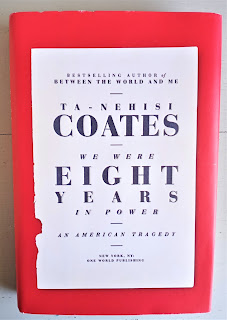Q: Craft: Apart from studying books/courses about how to write, many writers hone their craft by reading the work of others. Can you share any insights you’ve gleaned this way? What about tricks or tips you’ve picked up from other forms of storytelling, like TV or movies? Any examples of how such insights have influenced your work?
What a great question for the thoughftul, reflective, deliberate writer. For an extreme pantser like me, with a working method we could kindly call "organic" and more honestly call "chaotic" . . .?
I'll try.
I'm halfway there, in that I don't have a ton of intrusive how-to manuals and courses to set aside before I get to the meat of the question. Guess why. The sum total of my book learnin' about writing is Stephen King's On Writing - read and re-read and recommended - plus Anne Lamott's Bird by Bird, bought but not yet opened.
But I am reading my twentieth other book of the year right now. (They're here, if you're interested.) Four non-fiction, four general fiction, and that leaves twelve crime novels. So if my craft is being honed at all - and who's to say? - there's a good chance that it's other writers of mystery fiction honing it.
I'm glad the question says "read", glean", and "pick up" rather than "study", "identify" and "collect" though because I absolutely, unashamedly, and as avidly as ever after twenty-two years of being a professional writer, approach every book for pleasure and nothing else.
Still, I learned what could be done with multi-POV plots from Mary Higgin Clark. As did Harlan Coben and he's no slouch when it comes to plotting. Not that I can do what MHC did - God, that past tense still hurts - but it offers me inspiration to try. I think some of it is that she gives her characters strong distinctive names and, in early chapters, uses quite a simple sentence structure with the name in subject position to ground us in the voice. Aw hell - gave her characters, used a structure. Oof.
One of the other books I've devoured and adored this year so far is L.A. Weather by Maria Amparo Escandon. It's not crime fiction so much as melodrama, but it does have a puzzle at its heart and a heisty caper tossed in there too, so I'm claiming it. The reason I've picked it to talk about today - and am going to use it in a "masterclass" on settings tomorrow as part of Murderous March - is that Escandon embraces what it means to write about Los Angeles in a way I never want to let slip out of my mind. Would a writer necessarily mention roads, traffic, alternate routes and parking on almost every page in a perfect world? Probably not. Could there be a realistic novel about L.A. that didn't have characters bickering about whether to stay on the 10 or take the 110, then reveling in the gift of a parking space six inches longer than their SUV and only two blocks from where they needed to be? Definitely not. In my case, I've pledged never to forget that if it's Scotland, it's raining. And it's Escandon's L.A. traffic I'll have to thank.
It's not always so on the nose as that, though. The book I'm reading right now is Ta-Nehisi Coates' We Were Eight Years in Power and what I'm being reminded of (while also being enchanted and educated) is the power of a really perfect line to make you pause in your reading, go back, read again, read aloud, read out to anyone in earshot . . . As mystery authors we think about plot, characters, setting (especially tomorrow), clues, pacing and all the other mechanisms involved in delivering a satisfying story. So, just as we're always told to look up into the distance now and then when we've been staring at a screen, one of the reasons I read poetry is to revel in language without narrative for a change, language dialled up to eleven and saturated with colour, langauge for the sheer joy of it. Language like:
Split the lark - and you'll find the music - bulb after bulb in silver rolled
or
See no past greatness in ourselves and thus no future glory
or
Sleep that knits up the raveled sleave of care / the death of each day's life.
Except that middle one wasn't Shakespeare or Emily Dickinson and it wasn't poetry. It was half a sentence from Coates' essay on the Civil War. Wow, right?
In conclusion - there's something about this topic that reminds me of writing essays (back in the day when I couldn't get away with "Wow, right?" as a literary response) - I reckon the reading I do for pleasure can't be harming my writing and even if I don't dissect it and pinpoint its effect, I'm going to carrying on lying in a hammock, eating grapes, reading a book and calling it working.
Cx





4 comments:
Great topic. The only how to book I’d add is Reiner Rilke’s Letters to a Young Poet for inspiration.
I firmly believe reading should be classified as "learning by osmosis." LOL
Martha - I've ordered it. And Liz - absolutely.
Thank you for this great post. I work with a similar lack of, ummm, structural integrity? When Erika was editing my post for tomorrow, she kindly said "You didn't answer the question, but it's an interesting post." I'll take that. You did answer it. And well. Funny I mention you in it and your brilliant ability to create three dimensional setting. I was just thinking I need to get some poetry to read. So double thanks!
Post a Comment